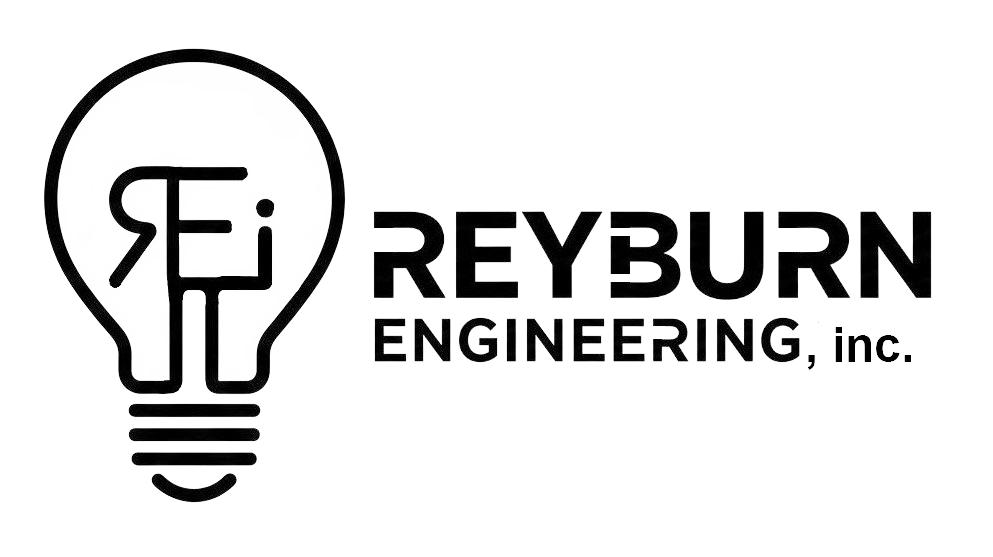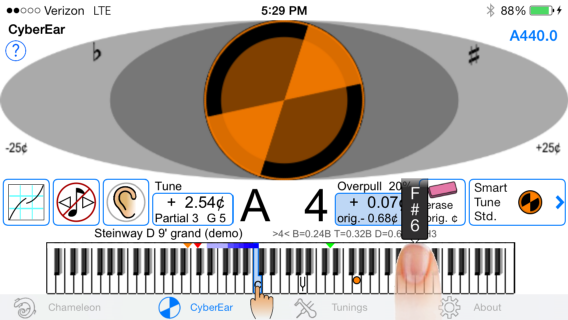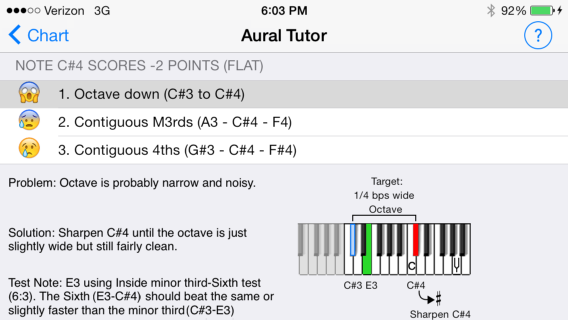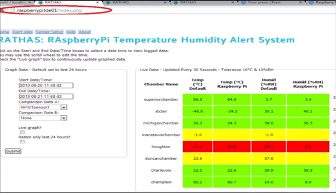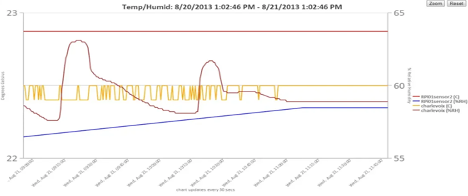CyberEar realtime tuning module
Aural Tutor expert system
Pianlyzer, visual display of sound
CyberTuner: 30 Years of Platform Transitions and 99.9975% Uptime
Professional iOS app serving the piano technician industry since 1996
Developed by Dean Reyburn (RPT, 43 years software engineering) with Noah Reyburn (BS EE/CS) leading server architecture and iOS development since 2013.
CyberTuner demonstrates our core expertise in legacy system modernization and reliability engineering. Over 30 years, we've successfully navigated seven major platform transitions—from 68K Motorola processors through PowerPC, Intel Macs, Windows, Windows Mobile, and now modern iOS/iPadOS—maintaining a single codebase and protecting all user data throughout every platform transition. Since 2013, Noah Reyburn has been instrumental in CyberCloud server architecture and ongoing iOS feature development.
Key Technical Achievements:
Redundant server architecture: After a 24-hour outage in 2014, we designed a geographically distributed backup system across independent hosting providers and power grids, achieving 99.9975% uptime (13 minutes downtime/year vs. the industry-standard 1-2 days)
Aural Tutor expert system: Automated diagnostic tool that analyzes piano tunings and provides step-by-step correction guidance, demonstrating our ability to encode domain expertise into teachable, explainable AI systems
CyberEar AI Mode: Advanced tuning algorithm that applies human aural tuning principles to optimize every piano as a unique instrument—developed years before the current AI boom
Real-time signal processing: Sub-millisecond audio analysis with accuracy to 0.01 cents (1/10,000th of a semitone)—exceeding the physical accuracy limits of any acoustic piano
Cross-platform parallel processing: Real-time four-thread architecture successfully implemented across Windows threads, POSIX threads, NSThread, and Grand Central Dispatch—separating UI, audio, DSP, and graphics for responsive sub-millisecond performance on all platforms.
Domain-specific AI assistant: Custom-trained CyberAssist achieving 97% accuracy using Claude Sonnet and Haiku for software support and tuning guidance
Cloud sync with robust conflict resolution: Sophisticated data protection that minimizes user interruptions
Graphics modernization to Metal: Migrating real-time GPU-accelerated pitch display from deprecated OpenGL to Apple's modern Metal framework, ensuring long-term compatibility and performance optimization
30 years of continuous operation: Profitable through seven platform transitions, proving sustainable architecture decisions
What This Demonstrates:
Complex real-time data processing under performance constraints
Enterprise-level reliability engineering
Long-term platform migration expertise
Modern AI integration for domain-specific applications
Building systems that must work flawlessly for professionals whose livelihood depends on them
Team expertise spanning 43 years (Dean) and 12 years (Noah) of continuous development
Current tech stack: iOS/iPadOS, C, C++, Objective-C & Swift, iCloud sync, Metal graphics, Python, Flask proxy server, Claude API
Figure 1: Accessing the RATHAS Web Interface
Figure 3: Multi-Sensor Comparison Graphing
Figure 2: Environmental test chamber with RATHAS installed
RATHAS: Raspberry Pi Temperature/Humidity Alert Systems
Professional environmental monitoring system for environmental test chambers and climate-controlled environments.
Developed by Noah Reyburn (BS EE/CS) with embedded systems expertise. Deployed in production test facilities since 2013.
RATHAS demonstrates core expertise in embedded systems engineering and industrial IoT applications. Over 12+ years of production deployment, the system has provided continuous environmental monitoring in critical test facilities—maintaining data integrity across hardware platform upgrades and protecting valuable test equipment throughout operation. The system successfully combines Raspberry Pi hardware with Sensirion SHT25 industrial sensors to deliver laboratory-grade measurements at consumer hardware prices.
Key Technical Achievements:
● High-precision monitoring: Achieved ±0.3°C temperature and ±1.8% RH accuracy using Sensirion SHT25 industrial sensors with custom I2C interface implementation
● Multi-sensor architecture: Designed scalable I2C bus system supporting up to 5 simultaneous sensors with individual alert thresholds and data logging
● Real-time web dashboard: Built responsive PHP/MySQL interface with interactive JavaScript charts for live data visualization and historical analysis
● Automated alert system: Implemented SMTP-based notification system with configurable thresholds and multi-recipient support for 24/7 monitoring
● Reliable data acquisition: Python-based polling system with 30-second logging intervals and MySQL database persistence for compliance audit trails
● Cost-effective solution: Delivered enterprise monitoring capabilities at <10% the cost of commercial alternatives while maintaining industrial reliability standards
● Production deployment: Successfully operated in multiple test facilities with 99%+ uptime, preventing costly equipment failures and test invalidation
● Edge computing architecture: Implemented distributed processing with local data acquisition, analysis, and alerting—reducing network dependencies and enabling autonomous operation during connectivity loss
● Printed circuit board design and implementation in challenging environments
What This Demonstrates:
● Embedded Linux system design and deployment
● Industrial sensor integration and I2C protocol implementation
● Full-stack development: Python, PHP, MySQL, JavaScript
● Real-time data acquisition and processing
● Building reliable systems for unattended 24/7 operation
● Hardware/software co-design for IoT applications
● Understanding production requirements: reliability, maintainability, cost-effectiveness
Current tech stack: Raspberry Pi (BCM2835 SoC), Industrial sensors, I2C protocol, Python, Raspbian Linux, MySQL, Apache/PHP, JavaScript (MooTools/jQuery frameworks), Canvas API, Citadel SMTP


